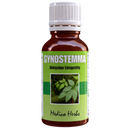Description
Gynostemma pentaphyllum, also called jiaogulan (, literally "twisting-vine-orchid") is an herbaceous vine of the family Cucurbitaceae (cucumber or gourd family) indigenous to the southern reaches of China, southern Korea, and Japan.
Jiaogulan is best known as an herbal medicine reputed to have powerful antioxidant and adaptogenic effects that increase longevity. Gynostemma Pentaphyllum (botanical name), or Jiaogulan jian-gu-lan (Chinese name), is a five-leafed adaptogenic herb. It has the unique ability to restore homeostatis (balance and equilibrium) to all five body systems.
The body systems are the cardiovascular, the digestive, the immune, the nervous, and the reproductive systems. The chemical constituents responsible for the adaptogenic characteristic of Gynostemma are saponins (triterpene glycosides or gypenosides). Gynostemma contains the widest range of saponins from all the plants in nature.
There are approximately four times as many saponins in Gynostemma Pentaphyllum as there are in ginseng. There are more than 100 different gypenosides in Gynostemma, all very similar to the ginsenosides of Panax Ginseng and Siberian Ginseng. Four of Gynostemma's saponins share the identical chemical structure as the saponins found in Ginseng, and eleven more are nearly identical.
There is a saying that Gynostemma is "Ginseng at a tea price." Weight control Gynostemma has developed a large following in Asia in weight control programs. It has a double-directional efficacy regarding body weight. It will help reduce weight in overweight people and help slim people and athletes to gain weight. It helps adjust blood sugar levels and reduce blood fat (hyperlipidemia), which are vital steps in attaining healthy metabolic function. Gynostemma helps maintain healthy bowels. It acts as a cleanser in the stomach and intestines, eliminating the body of toxins and waste.
Antioxidant: As an antioxidant, gynostemma boosts the immune system by increasing the number and activity level of white blood cells. It strengthens the digestive system by assisting in liver function. It helps relieve stress by soothing and relaxing the central nervous system. It is calming when one is overexcited and stimulating when one is depressed.
Studies have shown that Gynostemma is useful in a number of neurological conditions, including depression, anxiety & stress. Anticancer Studies into the anti-cancer activity of Gynostemma have shown a significant inhibition rate on a broad cross-section of cancer cells. Intensive studies are being conducted into both its anti-cancer activity and its potential as an immune protection / prophylactic agent for HIV-infected patients. There is research indicating that Gynostemma may prevent cells from becoming cancerous in the first place and may disrupt cell division in existing cancer cells.
The locals call it 'Miracle Tea' Gynostemma contains many amino acids, vitamins, and minerals that are healthy for the human body, including calcium, iron, magnesium, phosphorus, potassium, selenium, zinc, and more. The locals who cultivate & consume Gynostemma call it 'miracle tea' Tea for Emperors & Kings The first emperor of the Qin Dynasty, Qin Shi Huang who conquered all the independent states in China and established the first Chinese empire had to endure long hours of work during which he enjoyed drinking a very special tea. He had ordered this special tea to be prepared for him from a herb authorized only for the use of the Emperor. The herb was, and still is, Gynostemma Pentaphyllum. The plant is best known for its use as an herbal medicine in traditional Chinese medicine. A botany book by Wu Qi-Jun from 1848 Zhi Wu Ming Shi Tu Kao Chang Bian discusses a few medicinal uses and seems to be the earliest known documentation of the herb. Jiaogulan had been cited previously as survival food in Zu Xio's 1406 book Materia Medica for Famine. Until recently it was a locally known herb used primarily in regions of southern China. It is described by the local inhabitants as the "immortality herb", because people within Guizhou Province, where jiaogulan tea is drunk regularly, are said to have a history of living to very old age.
Jiaogulan is most often consumed as an herbal tea and is also available as an alcohol extract. It is known as an adaptogen and antioxidant that has been found effective in regulating blood pressure, lowering cholesterol, and improving endurance. Because of its adaptogenic effects, it is frequently referred to as "Southern Ginseng," although it is not closely related to true Panax ginseng.
Its chemical constituents include the triterpenoid saponins gypenosides which are closely structurally related to the ginsenosides from the well-known medicinal plant ginseng.[citation needed] Jiaogulan is also believed to have calming effects and to be useful in combination with codonopsis for jet lag and altitude sickness.


